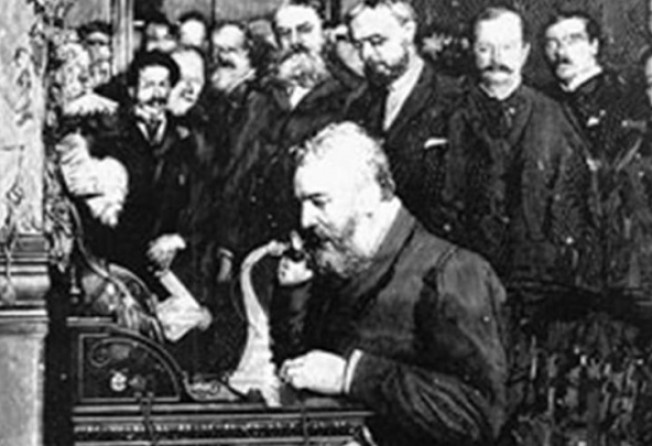The tragic tale of the telephone's real inventor, Antonio Meucci
The invention of the telephone is wrongly attributed to a Scot when in fact it was a little-known Italian, Antonio Meucci

This month, newspapers around the world including the South China Morning Post reported that a wax-covered cardboard disc with the voice of Alexander Graham Bell engraved on it had been recovered in the Smithsonian collections of early recordings.
Reuters reported that the recording was made 128 years ago, "nine years after he placed the first telephone call". On the recording, Bell is heard to say "Hear my voice - Alexander Graham Bell".
On reading this, many Italians like myself had just one thought - that this was the voice of a thief. We know that Bell did not invent the telephone, but stole the idea without acknowledgement from Antonio Santi Giuseppe Meucci. Bell was born in Edinburgh, Scotland, in 1847, and moved to Canada in 1870. He died in the US in 1922 as a highly respected millionaire scientist entrepreneur. He was indeed a gifted technician but had a nasty side to his personality. He presided for many years over the Eugenics Society, which proposed - and, in several cases, achieved - the forced sterilisation of individuals it considered inferior.
The real inventor of the telephone - which he called "electrophone" - was Meucci, who was born in Florence in 1808 and died impoverished in New York in the closing years of the 19th century. Meucci was a patriot and friend of Italy's national hero, Giuseppe Garibaldi (who also visited Hong Kong, Macau, Canton and Xiamen in 1851).
Meucci begun testing primitive telephones while working in Florence as a theatre technician. Later, for political reasons, he and his wife were arrested and expelled by the Tuscan State. They moved first to Cuba and then to the US.
Having fallen on hard times - his savings disappeared with fraudulent debtors - he spent what little money remained left pursuing his dream of voice communication across vast distances. He filed a patent caveat in 1871 - not a full patent that would cost US$250, which he did not have - five years before Bell filed his patent. When it came time to renew his own patent, Meucci couldn't even raise the US$10 renew fee.
Meucci was aboard the Staten Island Ferry in 1871 when a boiler exploded killing 125 passengers and injuring hundreds more. While recovering from his burns, Meucci discovered that his wife had sold the contents of his lab, including the telephone, for a total of US$6 to buy medications.
Not yet resigned to his bad luck, Meucci took his notebooks with all his experiments and a new prototype of telephone to Western Union telegraph company, but their executives (friends and colleagues of Bell) failed to meet him and later claimed to have lost the items he had given them. Two years later Bell filed a patent and set up a company with Western Union.
Meucci sued, and the court case drew considerable public sympathy for the poor Italian immigrant who could barely speak English. But the judge ruled in favour of Bell, perhaps because he, as a skilled businessman and man of means that he was, had in the meantime set a company with branches around the world.
Meucci died without being able to appeal. In 2002, a new ruling by the US House of Representatives declared the ruling invalid. The US Congress found that Meucci had indeed tested a telephone in 1860 and that Bell had had access to his material.
This was not a case of two gifted inventors reaching the same conclusion at the same time, as often happens, but a clear cut case of fraud and misrepresentation. Alexander Graham Bell became a wealthy man with his invention but failed to extend a helping hand to its less fortunate inventor, who was an immigrant like himself. This should not surprise us because Bell showed himself to be a man who strongly believed in the survival of the fittest and, of course, the smartest.
Angelo Paratico is a businessman, novelist and foreign correspondent based in Hong Kong